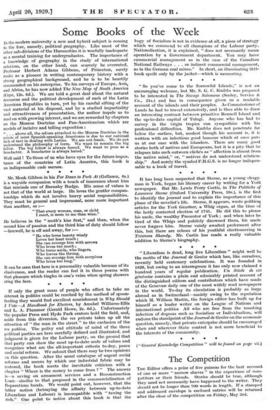If only the great mass of people who affect to
take no Interest in politics could be reached by the method of spoon- feeding they would find excellent nourishment in Why Should I Vote—A Handbook for Electors, by Amabel and L. A. Plummer (Gerald Howe, 2s. 6d.). Unfortunately the popular Press and Hyde Park orators hold the field, and, aside from this diversion, the Tea privata takes up all the attention of " the man in the street " to the exclusion of the res publica. The policy and attitude of mind of the three political parties are here carefully defined and illustrated, and judgment is given for the Labour party, on the ground that that party can show the most up-to-date scale of values and recognizes what are the all-important criteria to-day, peace and social reform. We submit that there may be two opinions on this question. After the usual catalogue of urgent social reforms and means by which our industrial fabric may be restored, the book meets the inevitable criticism with a chapter " Where is the money to come from ? " The answer is—a saving on armament services and a Reconstruction Loan—similar to that proposed in the commercialization of Reparations bonds. We would point out, however, that the latter notion (betraying the affinity between up-to-date Liberalism and Labour) is incompatible with " taxing the rich." One point to notice about this book is that the
bogy of Socialism is not in evidence at all, a piece of strategy which we commend to all champions of the Labour party. Nationalization, it is explained, " does not necessarily mean operation by a Government department. You may have commercial management as in the case of the Canadian National Railways . . . or indirect commercial management, as in the German coal mines." In short, an illuminating little book spoilt only by the jacket—which is nauseating.
























































 Previous page
Previous page